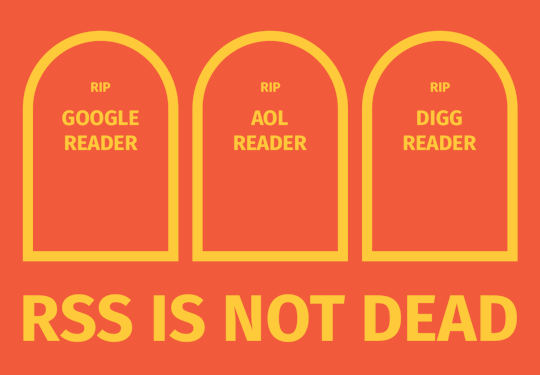RSS is not dying, poorly run products are

Many celebrities have been declared dead on social media, and have had to go to their Twitter and proclaim that “No, I am in fact not dead”. Today, it’s easier to declare the death of someone, than it is for that someone to stop the spread of misinformation.
Recently many have been calling the death of RSS, with no physical person to refute the fact, I thought I’d take a stand. RSS is in fact not dead.
This topic came up once more after Digg Reader announced that they are shutting down. A relatively young RSS feed reader that popped up after Google Reader announced their shut down. In the beginning of 2018, AOL Reader announced the same. Also a service that came to life following Google Reader.
To first dig deeper into what the death of RSS would mean, one would have to first understand the life of RSS. In the historical context the answer to the question might lie. We must also learn what RSS has done for us, but also what it can do in the future.
RSS is a tool, not a solution. The contents of an RSS feed can be many things. A blog post, a news article, but also a new job posting, a court case update, stock ticker updates, weather forecasts. The tools that have shut down have been jack-of-all-trades, master of none.
RSS in itself is not product market fit. When Google Reader was shut down many users were confused. They used it every day. The reason was probably both lack of growth, and lack of revenue possibilities. While in in its hay day, everyone and their uncle knew what RSS was. There was still a great hurdle to get into it. Unless the site owner advertised it correctly, the RSS feed was difficult to find. Thus organic growth was hard to count on.
RSS feeds are habit forming, but not immediately profitable. The openness of RSS poses a challenge for the developers building their product. How do I charge for something when someone else can build something similar for a lower price, or free? Also an ethical question. How do I essentially make money off someone else’s content? Normally, the number of eyeballs equals to the scale of the advertising profit to be made. But advertisers are hesitant to put their name next to dubiously owned content.
RSS was once a buzzword, just like web 2.0, chatbot, like AI and blockchain are today. By that I mean you can put together a VC deck containing only these words and investments are almost guaranteed to flow in. Now that the buzz has died down it’s found its place. The time of great growth is gone, but we’ve seen that it continues to attract new users as much as ever.
All things concluded, RSS is just a standard for sharing updates of content. It’s a powerful standard that cannot die. However, the Google Reader-style one-size-fits all approach has outgrown itself.
News is one of the larger and simpler use-cases for RSS. As more specialized tools have matured, the need for a Google/Digg/AOL Reader have diminished. It can still be an excellent alternative, but a difficult one to setup. The options for customization are infinite though.
RSS lets site owners focus on the things they do great. Building the apps for receiving notifications is something that can be offloaded to RSS readers. As a tool for quick notifications to get users to get back to their site, it’s great. As a place where their content is being read instead of their own platform, maybe not always. It’s a fine line that needs to be balanced.
Opportunists have been looking for a quick buck ever since Google Reader shut down. And they all keep making the same mistake over and over. They all share the same modus operandi: A RSS reader shuts down, the big exodus of users need somewhere to go. A venture backed company sees the opportunity to attract big growth in a short time. With users, revenue must follow. However, it doesn’t. Growth stagnates. Venture capitalists lose patience. The RSS reader shuts down. The users are the victims.
Why are people saying RSS is dying? Obviously the big RSS readers are getting shut down, one after other. The problem isn’t RSS technology. It is the expectations from the businesses that own the feed reader’s. People are tired of being the product.
Change is never easy. Sometimes it’s fun, other times not, but it’s always hard. The news of Digg Reader shutting down is not immediately great, but there is a case for the innovation it can bring. A market with fewer but stronger players will probably be a better breeding ground for innovative services that will last longer. It leads to a healthier market.
Who are we? We are Feeder. A healthy RSS reader company since 2010. Grown organically to over 600.000 users. With healthy revenue streams from businesses and business owners. We want to change the way we consume information. Level the playing field of information flow. Basically, we want any update in the world be available to anyone, anywhere, exactly as it happens.
Join us in being part of the future of RSS. Demand better tools and don’t let yourself be the product.